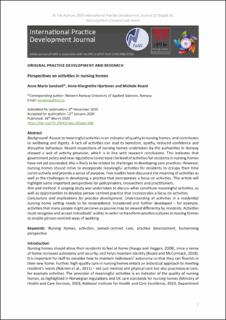Perspectives on activities in nursing homes
Peer reviewed, Journal article
Published version
Permanent lenke
https://hdl.handle.net/11250/2652011Utgivelsesdato
2020Metadata
Vis full innførselSamlinger
- Import fra CRIStin [3604]
- Institutt for helse- og omsorgsvitskap [2776]
Originalversjon
Sandvoll, A. M., Hjertenes, A.-M. & Board, M. (2020). Perspectives on activities in nursing homes. International Practice Development Journal, 10(Suppl), 1-12. https://doi.org/10.19043/ipdj.10Suppl.006Sammendrag
Background: Access to meaningful activities is an indicator of quality in nursing homes, and contributes to wellbeing and dignity. A lack of activities can lead to boredom, apathy, reduced confidence and disruptive behaviour. Recent inspections of nursing homes undertaken by the authorities in Norway showed a lack of activity provision, which is in line with research conclusions. This indicates that government policy and new regulations to increase the level of activities for residents in nursing homes have not yet succeeded; this is likely to be related to challenges in developing care practices. However, nursing homes should strive to incorporate meaningful activities for residents to occupy their time constructively and provide a sense of purpose. Few studies have discussed the meaning of activities as well as the challenges in developing a practice that incorporates a focus on activities. This article will highlight some important perspectives for policymakers, researchers and practitioners.
Aim and method: A scoping study was undertaken to discuss what constitute meaningful activities, as well as opportunities to develop person-centred practice that incorporates a focus on activities.
Conclusions and implications for practice development: Understanding of activities in a residential nursing home setting needs to be reconsidered, broadened and further developed – for example, activities that many people might perceive as passive may be viewed differently by residents. Activities must recognise and accept individuals’ wishes in order to transform practice cultures in nursing homes to enable person-centred ways of working.

